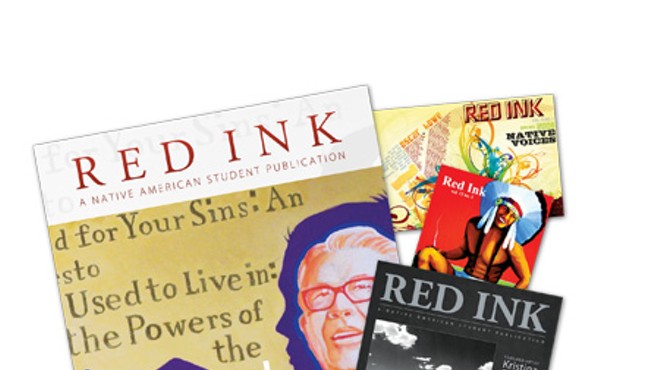Old habits die hard, they say—but how hard will the transition be from paper books to digital media for readers and retailers?
And what will the authors currently assembling for the Tucson Festival of Books be signing 10 years from now? Imagine, for example, a futuristic iPad, Kindle or Nook on which an author places his or her thumbprint, instantly generating a stored signature and activating a built-in camera which would record the event, adding a video record as an annotation.
While no one is quite certain what the future may bring, those tracking such possibilities are hurriedly trying to figure out the implications of newly emerging formats. Still, as Stephen King put it on CNN, "The book is not the important part. The book is the delivery system. The important part is the story."
Let's say you go into one of Barnes and Noble's 700-plus superstores, and purchase a $26 hardcover best-seller. The production cost on that book was an estimated $4.05, and the author will receive about $3.90. That leaves $18.05 to be shared between the publisher and the bookstore, after shipping costs. It also assumes that the book will be sold, and not returned, or "remaindered," as they say in the trade.
With an electronic book downloaded from the Internet, however, there are no returns or shipping costs, and for an average $9.99 eBook, the production cost is 50 cents. The author gets $2.12, leaving the publisher and provider with $7.87 to share, without having to pay overtime or taxes on brick and mortar. No trees are cut down to make these books, either, and although plastic and silicon go into the devices storing them, you can carry hundreds of books in the palm of your hand (which also makes moving easier). Add to this the news that iPads and Kindles have sold millions of units in the past year, and you'll understand why digital book sales are rising fast, while printed-book sales are flat or even declining. As a consequence, Barnes and Noble is rethinking its business model in America, while Sony anticipates strong demand for digital books and new easier-on-the-eyes "e-ink" eReaders in Asian markets.
Does this mean print books won't be found at future festivals? A recent Mashable.com poll (not scientific) showed that a plurality of consumers (41.9 percent vs. 23.24 percent) still prefer turning paper pages. It is unlikely that print books will ever go away entirely.
But the technology and the trends do not lie. While the electronic-book market is only around 5 percent of total sales today, according to The Wall Street Journal, by the end of 2012, that figure will be 25 percent, then 50 percent by the end of following year. And by 2015, China will be the largest market for books in any format.
Times, they are a-changin,' to quote Dylan. This may mean the closure of more bookstores, both independents and chain stores.
Another aspect to the changing publishing industry is the success of audiobooks, which are becoming more and more like audio movies, with screen actors like Sandra Oh and Michael Madsen joining longtime narrators in multi-cast productions with transition music and sound effects. According to the Audio Publishers Association, the industry clocked its first billion-dollar sales year in 2008, thanks to consumers who want to multitask while driving or doing chores. "It is one of the few bright spots in publishing," APA public relations manager Kaitlin Friedmann told me.
While there was a slight slump in 2009 due to the recession, audiobook downloads have shown a steady increase as a percentage of sales, up from 17 percent in 2007 to 29 percent in 2010. What began as cassette collections produced by the Library of Congress in the early '70s has now led to Audible.com downloads in the millions per month, with traditional CDs and MP3 CDs being engineered for traditional markets by audio divisions at Random House, HarperCollins, Simon and Schuster, Hachette, Penguin and dozens of smaller independents.
What do authors think of all this? Most of those I've interviewed in the past—including David Baldacci, Janet Evanovich and James Patterson—are bullish on alternative book media, and do not see the hardcover decline as foretelling their own extinction. Patterson, like Stephen King, has championed eBooks and audiobooks by providing free digital chapters of upcoming releases. King has even narrated some of his stories on audio, while Patterson told me, "Ever since I moved out of New York City, I've been addicted to audiobooks. I listen to one or two a week while I'm driving around town. Generally, I listen to the books that I used to buy, but never get around to reading."
Michael Blanding, an award-winning investigative journalist who will be at the Tucson Festival of Books, told me, "I've been pleasantly surprised at the response my book has gotten with alternative media—both the audiobook version from Tantor Media, and especially the eBook. At some point in the past few months, the Kindle and iPad versions of my book have sold even better than the print edition. That's great, because it exposes a whole different readership to the book. These are people who might not otherwise plunk down for a hefty hardcover. I think there will always be people like myself who prefer to read a print edition, but I don't think it's a bad thing to expand the market with these alternative forms of media, either."
Blanding's book is The Coke Machine: The Dirty Truth Behind the World's Favorite Soft Drink. The truth about digital media is that it isn't just "pop," and it won't be fizzing out in the foreseeable future.








